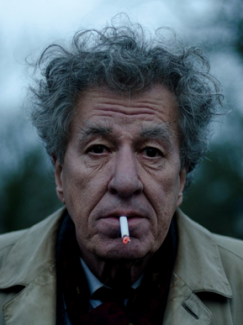Final Portrait (Tucci, 2017): Great Britain
Reviewed by Larry Gleeson. Viewed at Berlin Film Festival press screening.
Stanley Tucci’s newest film, Final Portrait, is set in Paris, France, 1964, and is based on James Lord’s biography, “A Giacometti Portrait.”
The film opens in slow motion with voice over narration provided by Armie Hammer. Hammer plays James Lord. Geoffrey Rush turns in a stellar performance as the quirky Alberto Giacometti at the height of his fame having received Grand Prize at the Venice Biennale for sculpture in 1962. Lots of grays, whites, and a touch of navy blue dominates the film’s studio and cemetery scenes while the cafe scenes allow for color variety. James Merrifield did the Production Design with Costuming done by Liza Bracey.
Lord has come to see Giacometti to have his portrait done and soon discovers no portrait is ever complete. In an agonizingly slow scene with non-diagetic violins and strings, Lord rigidly sits while Giacometti begins his brushwork making comments toward Lord in often side-splitting dead-pan. Music was provided by Evan Lurie with Sound Design orchestrated by Tim Hands, Jack Gillies, and Tim Cavagin. A particularly funny comment from the first sitting is when Giacometti tells Lord he has the “head of a brute.” Later as Giacometti moves in close to gain a greater perspective, he declares Lord has the profile “of a degenerate’ despite Hammer brahmin-like portrayal of Lord.
Soon, Lord realizes the three days he originally scheduled won’t suffice and begins what becomes a pattern of cancelling and rescheduling flights to accommodate Giacometti’s process. And, what a process it is.
Giacometti has a passion and large appetite for women, food and wine. His women range from a high-end prostitute, Caroline, played by the soft French actress, Clémence Poésy, to the house maid, Annette, played by character actress Sylvie Testud.
Finally after nearly three weeks, Lord has realized he needs to take matters into his own hands if the portrait is ever to be completed as Giacometti has a recurring tendency to paint the negative, i.e., whitewash the canvas. However, along the way, the men, including Giacometti’s brother, Diego, an artist as well, and played by Tony Shalhoub engage in some philosophical meanderings and in some male bonding. Giacometti likes control and continually keeps Lord off balance with dialogues on suicide which he thinks about daily, and meaningful death experiences like burning oneself to death or slicing oneself from ear-to-ear. Sadly, Giacometti laments he can only die but once.
Tucci cast a fairly uninhibited look into Giacometti. Tastefully shot with most frames qualifying as portraits unto themselves. Danny Cohen was the Director of Photography.
Yet, some repetition detracts form the work as we see the mundane nature of Giacometti’s studio life one time too many. Yet, overall, Tucci tackles Giacometti in fine fashion. The film is entertaining and the casting, selected by Nina Gold, hits the mark with the strong, masculine Hammer portraying James Lord. Also, Rush is very good with his emoting. And, his physicalities are quite excellent. While the women appear as adornments both Poesy and Testud provide significant feminine wiles bringing to fruition Giacometti’s studio confession to Lord that as a young man he had difficulty sleeping until he imagined murdering two women…after raping them.
Fortunately, this episodic scenario is not carried out on screen Instead, Giacometti high-handedly pays off Caroline’s two pimps in a fashion and manner that they can’t refuse.
Final Portrait is a broad stroke for Tucci. With over 122 acting credits and only six directorial credits on imdb.com, Tucci churns out a fairly sophisticated piece of cinema reminiscent of earlier Wood Allen works including the Oscar-winning Annie Hall, as he brings Alberto Giacometti to light. Recommended.
About this entry
You’re currently reading “Final Portrait (Tucci, 2017): Great Britain,” an entry on Student Film Reviews
- Published:
- 02.11.17 / 10pm
- Category:
- Berlin International Film Festival 2017, Films

No comments
Jump to comment form | comments rss [?]